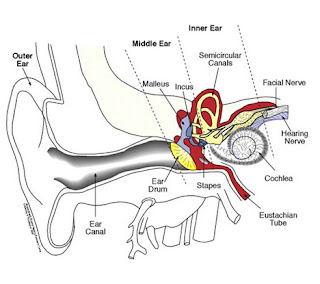
Hearing Loss
 What is hearing loss?
What is hearing loss?Hearing loss is a sudden or gradual decrease in how well you can hear. Depending on the cause, it can range from mild to severe and can be reversible, temporary, or permanent. Hearing loss is also known as hearing impairment, which includes being born without hearing (congenital hearing loss). This topic focuses only on gradual hearing loss.
Gradual hearing loss affects people of all ages and is the third most common long-term (chronic) health problem in older Americans.1 It affects up to 40% of people age 65 and older and up to 80% of people older than 85.2
If you have hearing loss, you may not be aware of it, especially if it has developed gradually. Your family members or friends may be the first to notice. For example, they may notice that you are having difficulty understanding what people are saying, especially when many people are talking at the same time or there is background noise, such as a radio playing.
Hearing loss can affect what and how much you do in the workplace and at home and can also affect your personal safety. Because it may result in less social interaction, hearing loss may contribute to loneliness, depression, and loss of independence. However, hearing aids and other devices are available to help you hear.
What causes hearing loss?
In adults, the most common causes of hearing loss are:
* Noise. Noise-induced hearing loss can affect people of all ages and most often develops gradually over many years. Over a long period of time, the noise you experience at work, during recreation (such as listening to very loud music), or even during common chores (such as using a power lawn mower) can lead to hearing loss.
* Age. In age-related hearing loss (presbycusis), changes in the inner ear that occur as you grow older cause a gradual but steady hearing loss. The loss may be mild or severe, but it is always permanent.
Other causes of hearing loss include earwax buildup, an object in the ear, injury to the ear or head, ear infection, a ruptured eardrum, and other conditions that affect the middle or inner ear.
What are the symptoms?
Common symptoms of hearing loss include muffled hearing and a feeling that your ear is plugged. You may have difficulty understanding what people are saying, and you may listen to the television or radio at higher volume than in the past and avoid conversation and interaction with other people. Other symptoms may include ringing, roaring, hissing, or buzzing in the ear (tinnitus). Or you may have ear pain, itching, or irritation, or fluid leaking from the ear. You may also have a feeling that you or your surroundings are moving when there is no movement (vertigo).
How is hearing loss diagnosed?
Your doctor will diagnose hearing loss by asking questions about your symptoms and past health and by doing a physical exam. If your doctor thinks you have hearing loss, he or she may use a "whisper" test or tuning fork to test your hearing. If these tests suggest or show hearing loss, your doctor will do a more complete hearing (audiologic) test to see whether you have hearing loss, how severe the loss is, and which part of the ear is affected.
How is it treated?
You treat noise-induced or age-related hearing loss by using hearing devices (such as hearing aids) and learning how to live with reduced hearing, such as paying attention to people's gestures, facial expressions, posture, and tone of voice. In other types of hearing loss, treating the problem that caused the hearing loss, such as removing earwax or taking medicine for an infection, results in the return of normal hearing.
Can you prevent hearing loss?
You can prevent noise-related hearing loss by avoiding loud noise such as that made by machines in the workplace, power tools, very loud music, and very loud motorcycles. Wear hearing protection, such as earplugs or earmuffs, if necessary. To protect yourself from hearing loss because of injury, avoid putting objects in your ear, wear seat belts when you drive, and wear helmets when you bike, ski, or participate in similar activities in which there is the potential for ear injury.






0 comments:
Post a Comment